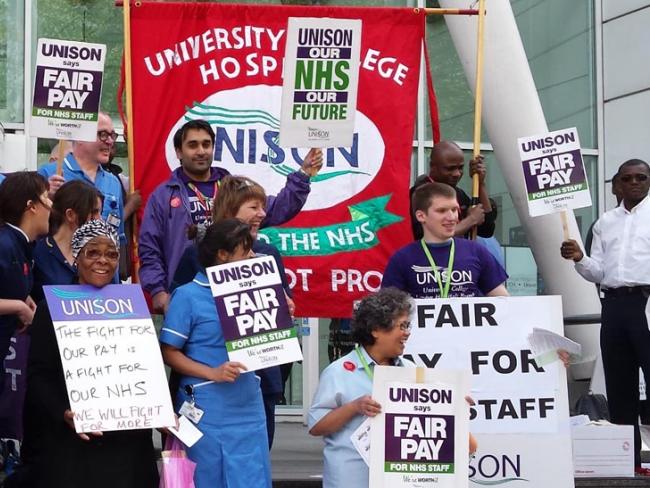
Workers picketing at UCH Hospital, London, during the pay dispute in 2014.
Members of Unison, the largest union in the NHS, have voted overwhelmingly to accept the latest pay agreement with the employers in England. Overall, 13 out of the 14 bargaining unions have said yes.
Since 2010, pay in the NHS has been cut every year. Despite the incessant and ignorant repetition that there has been a “pay rise”, or even a “pay freeze” every year, the reality is that inflation, and particularly inflation in the cost of the things workers need most to live and work, has increased by more, sometimes substantially more, than those “increases” there have been in pay.
When pay has gone up by 1 per cent and inflation by 3 per cent, then health workers have had a pay cut of 2 per cent. It’s now estimated that since 2010 cuts like these have amounted to several thousand pounds for many in crucial jobs.
Hunt and his cronies were waiting to see how long we’d put up with this state of affairs. There were enough straws in the wind for them to have understood that health workers won’t put up with it any longer, and neither, for that matter, would the NHS as a whole.
And let’s not forget Brexit, allegedly the cause of all our ills. In fact, because it will be a lot harder, and hopefully impossible, for the NHS to rely on “international” (a euphemism for foreign) workers, it will also be harder to use overseas labour to hold down wages here.
Change
All of which has meant that the new NHS pay deal is something different.
First of all, and not to be underestimated, it protects and reinforces the NHS pay system (known in the trade as Agenda for Change). Calls for its undermining or even abolition have been put to bed with this comprehensive deal.
In particular, attempts by Hunt to remove incremental progression have not only been warded off, but the scales have been compressed, which means that it now doesn’t take as long to reach the top, the rate for the job.
Second, it is funded by government – or, at least, the first of the three years over which it operates is, and if the second two aren’t there should be hell to pay.
Third, the rises themselves, while obviously not clawing back eight years of pay cuts in one go, represent the first steps in that direction.
Fourth, there was a danger that those at the bottom of the scales would be paid less than the national minimum wage. Such an indictment, and threat to the integrity of the pay system, had to be tackled, and it was. Those closest to the bottom of the scales will now gain most in this deal.
And although the agreement covers only NHS workers in England, the unions expect that government will make money available for similar arrangements in other parts of Britain.
Electronic voting
Unison, as the leading NHS union, has for many years been pointing out that as an alternative to simply bleating about how few members participate in ballots we should use electronic balloting. This decision has now been vindicated.
Postal turnouts of below 10 per cent have been regular, and even looked on as relatively high compared with some ballots and particularly with elections. The consultation on this deal has made a decisive turn by going online.
The turnout of 30 per cent is far from brilliant, but should represent a fundamental change in how members are involved. It’s also a creative way of addressing the fact that if the law, and our members, don’t change, Unison will never have a national dispute in the NHS again, as it’s now virtually illegal, with the requirements of the Trade Union Act meaning that more than 50 per cent need to vote in favour.
Although Unison is still a long way from that, this ballot turns an important corner. That of this higher turnout 84 per cent voted to accept shows a maturity in the membership often absent from many self-proclaimed “activists”, who will have a job on their hands to describe this as a sell-out.
